Downloading GNU Development Tools
In order to install the set of Cygwin tools, go to the web site at http://sourceware.cygnus.com/cygwin/
and look near the top of the page for readme and download links:
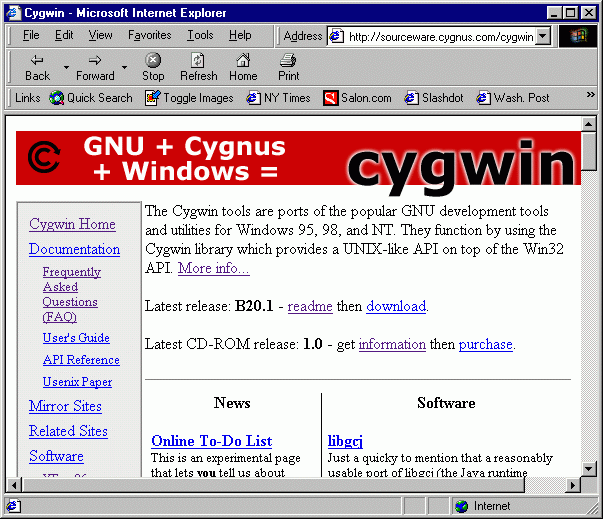
It is an extremely good idea to follow the "readme" link first, to
see:
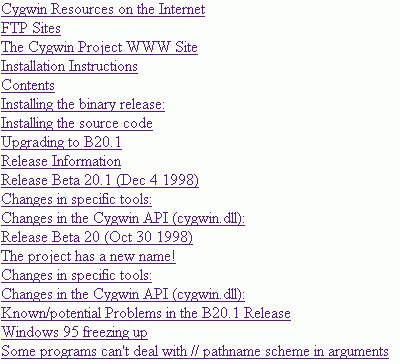
and get the installation instructions. I wanted the full binary release so I
went for the file full.exe. Back out one screen and choose the "FTP
Sites" option and choose the ftp site closest to you. For the purposes of
these instructions, I arbitrarily chose ftp://ftp.sunsite.utk.edu/pub/cygwin/.
Go into the "latest" subdirectory and find the full.exe file, which,
at the time of this writing, is 13.5 MB in size. From Internet Explorer, right
click on the file and choose the Copy to Folder... option. After the download is
finished, scan it for viruses (as should be done with all downloads).
Assuming it doesn't have any viruses that will melt your computer, double
click the file to install it. You'll see the InstallShield(R) Wizard begin and
continue until you get to the first dialog box:
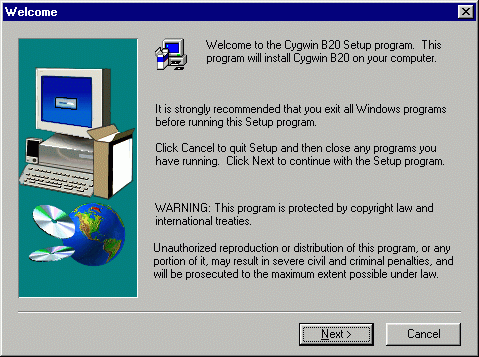
Click on the Next button and continue to follow the directions presented to
you by the series of subsequent dialog boxes. You will be presented with a
"destination folder" in which the software will be installed. You can
change it from the default if you like. Because I have a series of four 2 GB
partitions of my hard disk, I chose to install it on drive e:
The rest of the installation should be straightforward.
 Now see if the installation was successful by clicking the
Windows Start button, then select
Programs, then Cygnus Solutions, and finally, Cygwin B20. You should see a
"DOS" window open with the bash shell prompt:
Now see if the installation was successful by clicking the
Windows Start button, then select
Programs, then Cygnus Solutions, and finally, Cygwin B20. You should see a
"DOS" window open with the bash shell prompt:
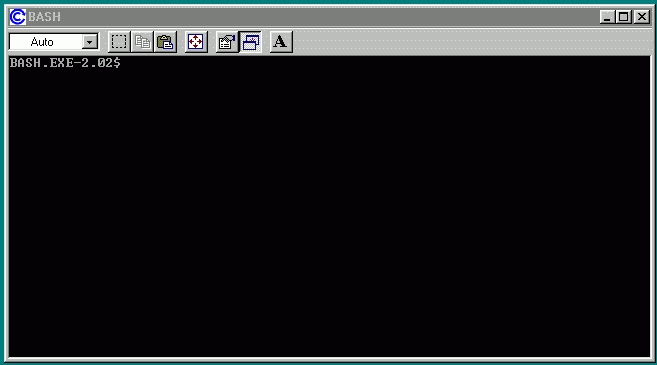
Following the instructions on the web pages, you'll need to type mkdir -p /tmp
and then mkdir -p /bin. This (apparently) creates c:\tmp and
c:\bin
subdirectories and you'll need to put a copy of she.exe (found in directory
e:\cygnus\cygwin-b20\H-i586-cygwin32\bin)
into directory c:\bin.
Try a few Unix commands to make sure you're not getting anything unexpected
in response:

The last step is to add the path to the directory containing the GNU tool
executable files, such as gcc.exe, g77.exe,
gdb.exe, and perl.exe. This
directory is the bin directory a few levels down from the directory in which you
installed the Cygwin tools. For example, on my machine, I installed the Cygnus
tools in subdirectory:
e:\cygnus
and so the GNU development tools are found in subdirectory:
e:\cygnus\cygwin-b20\H-i586-cygwin32\bin\
 Using Windows Explorer
it
looks like this:
Using Windows Explorer
it
looks like this:
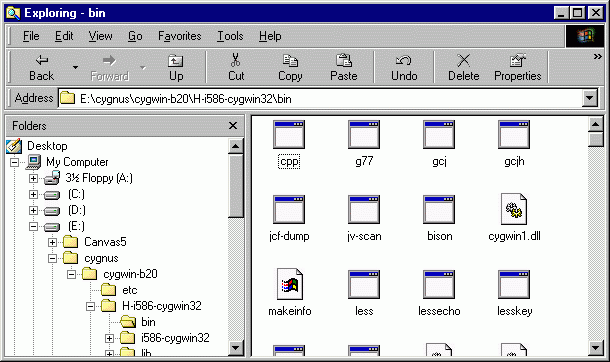
 Open your autoexec.bat file (you can use an ordinary MS-DOS
window) found in the root c:\ directory) and add the following line (the
specified e:\ directory is appropriate for my machine; depending on where you
installed your Cygwin, you may have to designate a different drive):
Open your autoexec.bat file (you can use an ordinary MS-DOS
window) found in the root c:\ directory) and add the following line (the
specified e:\ directory is appropriate for my machine; depending on where you
installed your Cygwin, you may have to designate a different drive):
set path=%path%;e:\cygnus\cygwin~1\h-i586~1\bin
Your autoexec.bat file should look something like this:

Reboot your machine to cause this change in the path to take effect.
![]()

